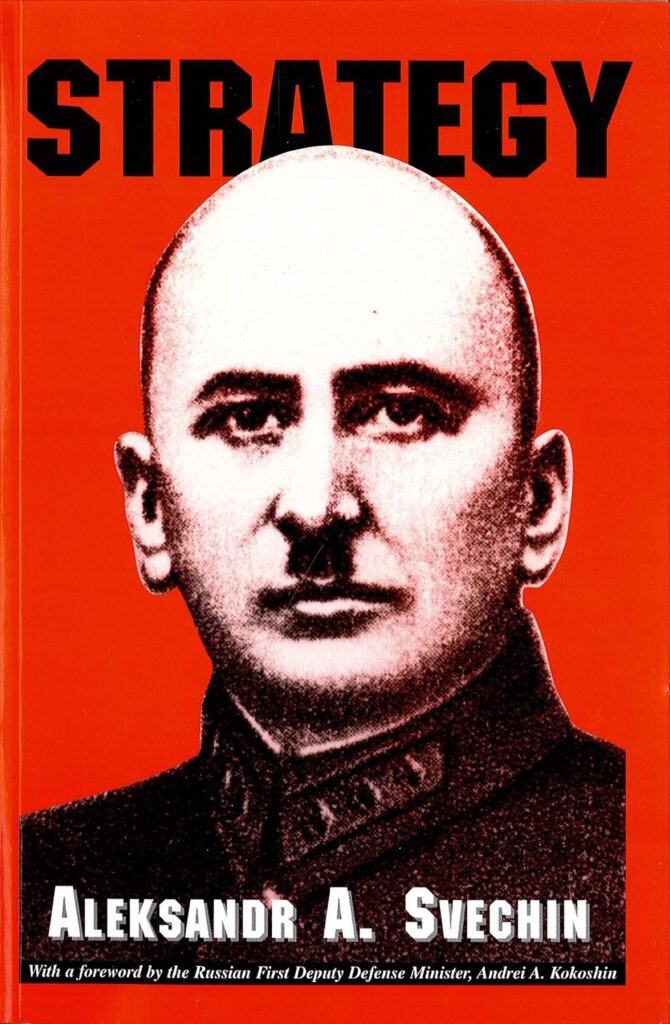
Svechin (1878-1938) was an outstanding Russian military theoretician and widely recognized as the Soviet Clausewitz. This book, strongly influenced by the writings and analyses of the contemporary and classic European figures of Svechin’s day,
Here are some quotes that come mostly from the first part of the book.
The ruling class in a state is inclined to regard its own interests as state interests and resorts to the aid of the state apparatus to defend them. Any struggle for one’s interests can only become sufficiently conscious and consistent when its goals have been clarified. Once they have been systematized, these goals form the program or idea of a given faction.
Organizations of individual factions for the purpose of struggling for a particular program are called political parties, because politics is the art of orienting a struggle for the purpose of carrying out the program of a certain faction. Because every program is based on economic interests and economics is the basis for a developing historical advance, we can see politics as a “concentrated expression of economics.” Only movements which are based on real interests can acquire a major significance. Even such a nationalistic writer as General von der Goltz has admitted that pure patriotism is wet powder which is incapable of igniting the masses.
In our opinion, the claim that politics is superior to strategy is universal in nature. There is no doubt that it is true when the creators of policy constitute a young class advancing to a bright future and whose historical health is reflected in the form of a sound policy. But it always leads to doubts in states which represent the organized dominance of an obsolete class, which are on the historical defensive and whose regimes have become decadent and have been compelled to follow unsound policies and sacrifice the interests of the whole to maintain their domination.
The economic aims of a war are achieved at the same time that the armed forces fight for their military goals and in conjunction with fierce fighting on the political front. If the enemy offers stiff resistance, victory will require efforts on all three fronts to destroy the very material conditions which make it possible for him to resist.
War is not a medicine to cure the internal illnesses of a state; rather, it is a very serious test of the health of domestic politics. Only the firm domination of certain classes within a country makes it possible to carry out prolonged political and strategic offensives.
By their very essence, the war plan and campaign plan should not merely call for the absolute growth of the armed forces but should prepare them for the missions the army and navy will have to carryout once a war begins. Hence work on the war plan should be based on clarifying the nature of a forth coming war and the characteristics of the enemy, which is why intelligence is so significant. It is quite important to gather information that characterizes the enemy’s political situation, his relations with other states, the tendencies of certain classes and the intensity of the struggle between them, the enemy’s overall economic situation and the special economic measures he has taken to prepare for war, and this information, supplemented by a study of the personalities of leading politicians, the history of the hostile state and the most authoritative opinions expressed in the press, make it possible to get an idea of the current economic and political policies of a state with whom war is possible and of how its ruling class pictures the continuation of these policies once a war begins. Only on the basis of this general study will a study of the enemy’s military capabilities be fruitful, and the latter should not be limited to getting an idea of the current strength of his armed forces and the accomplishments of his military preparations; it should also encompass the history of the growth of his army and the different phases of his resolution of war preparation issues. This study will allow a clearer view of the tendencies of his military development, the nature of his general staff’s conceptions of a future war and recent assumptions concerning initial operations.
A material battle is made up of local battles that grow to gigantic proportions and are sustained not so much by human casualties as by the expenditure of equipment and ordnance; deployment for a material battle should ensure us significant material superiority because of the surprise of the start of our operation and our superiority in lines of communication leading to a given sector of a front or our overall superiority in equipment. In view of the massive nature of the resources used, the question of communications plays a very important role in a material battle.

The quickness and expedience of canceling Ukraine as a story by Western media and their governments is a powerful demonstration. The purported concerns about Ukraine were never about principle or the alleged narrative of defending democracy. If there was any credible substance to that narrative then how is it dispensed with so readily? It is something to behold how Western media have simply dumped Ukraine as if it were damaged goods of no longer any use, or, worse, a soiled rag. — Western Media ‘Cancel’ the Ukraine Conflict as Palestinian Genocide Exposes Their Lies and Fake News Editorial by Strategic Culture